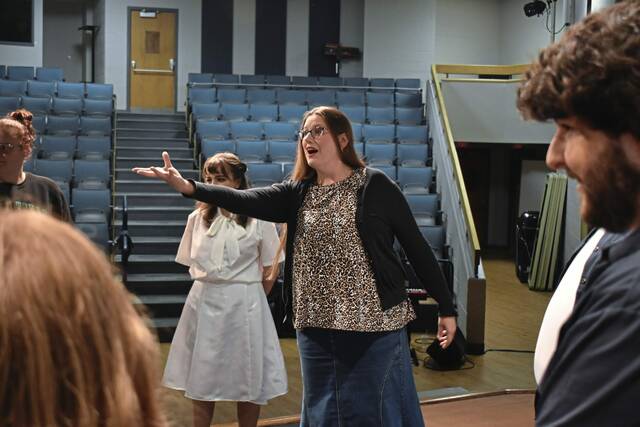https://naviga.triblive.com/local/westmoreland/new-pitt-greensburg-theater-director-brings-varied-background-including-improv-sci-fi-plays/
New Pitt-Greensburg theater director brings varied background including improv, sci-fi plays

Chryss Allaback believes theater arts is one of the best fields of study to pursue at the college level.
As an example, she points to the student actors and crew who recently staged a production of “A Streetcar Named Desire” in the Ferguson Theater at the University of Pittsburgh’s Greensburg campus. She joined the faculty there in September as an assistant professor and the new theater director.
“We treat this academic theater like a professional theater,” Allaback said. Under Allaback’s guidance, she noted, the students are “doing it for themselves.
“The stage manager is organizing people, she’s managing people. She’s responsible for an entire show. I’ve got an assistant stage manager in the back who’s managing people and designers who are managing people. They’re getting so many fantastic hands-on, transferable job skills.”
A Wisconsin native, Allaback brings to the Pitt-Greensburg classroom and stage an array of experience and training in performance and behind-the-scenes roles.
Inspired by her father and uncle, both musicians — and, perhaps, by attending a performance of “Hamlet” at age 5 — Allaback was writing and staging her own plays as a teen in the 1990s. She explains her high school lacked a theater program, but she and her friends appeared at a community auditorium — mostly in self-penned plays that reflected critically on consumerism and other facets of society.
“I was without any formal theater education,” she said. “I was an angry high-schooler.”
Her other performance skills include playing the French horn and Middle Eastern folk dancing.
She earned a bachelor’s degree in theater from Lawrence University in Appleton, Wis., a master’s degree in theater history from Illinois State University and a doctorate in theater arts from the University of Oregon, in 2009.
During a stint in Chicago, Allaback formed Eclectic Muse, a feminist sketch comedy theater troupe, with like-minded women she met while training at the Second City Conservatory.
She spent the last 18 years in Oregon, where she taught theater at several different colleges and ran theater productions at Umpqua Community College.
Drawing upon a lifelong interest, she was a founder of Trek Theater, a grassroots science fiction troupe in Eugene, Oregon. The group’s specialty has been staging homages to the “Star Trek” TV series and other genre works. She also worked on Star Trek-themed musicals.
When the covid-19 pandemic hit the Umpqua campus, Allaback found ways to produce plays virtually, using the Zoom platform and Topia metaverse platform.
“A lot of people all over the country were watching,” she said. “I was doing so much to keep the students engaged.”
Now, she’s happy to be working on live performances with students again, at Pitt-Greensburg.
In addition to preparing two stage productions per academic year, Allaback is teaching several courses: Theatre Practicum Performance, Intro to Theatre Arts and Acting 2.
When she joined the Pitt-Greensburg faculty, Allaback had to quickly select the initial play she would oversee. She chose “Streetcar” because it is a well-known American drama and offered roles for a good-sized cast of a dozen.
“It turned out very well,” she said. “The theater was full on opening night.”
For the university’s spring play, she’s hoping to stage a more obscure and adventurous piece, a French comedy titled “La Dispute” that explores questions of infidelity.
Penned in 1744 by Pierre de Marivaux, the play centers on a sociological experiment that brings together as young adults members of the opposite sex who have been raised in isolation. Allaback has asked a Belgian friend to prepare a fresh translation and is considering a futuristic setting that would put “a little sci-fi spin on it.”
Next academic year, she expects one of the Pitt-Greensburg productions to be a musical.
“Colleges are the great laboratory of theater, where we can try and experiment,” Allaback said. “We’re trying to build young artists and throw something complicated at them.
“Students should have experience doing a classic American realist play and something like ‘La Dispute.’ They should have experience doing something post-modern and something like Shakespeare. They can learn a lot.”
Copyright ©2026— Trib Total Media, LLC (TribLIVE.com)
